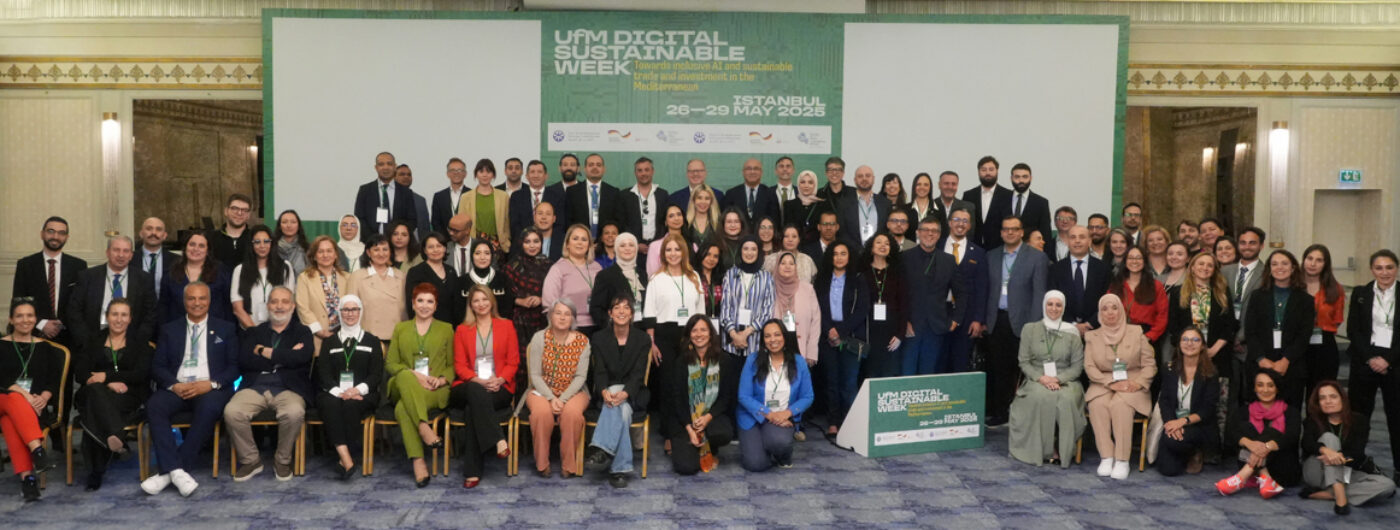
UfM Digital Sustainable Week explores AI’s promises and challenges in the Mediterranean Region
27 May 2025, Istanbul. The Union for the Mediterranean is hosting its first Digital Sustainable Week in Istanbul, an event designed to examine the role of artificial intelligence and sustainable investment in advancing inclusive development. As the Mediterranean—and the world—grapples with the seismic shifts brought about by digital transformation, the UfM is gathering policymakers, researchers, business leaders, journalists and civil society from May 26 to 29 to chart a path toward ethical and sustainable innovation in the region.
Organised in partnership with the German Development Cooperation (GIZ), the four-day event also spotlights issues relating to gender equality in digital spaces. One of the highlights in this regard included the Women in AI Awards, which recognise Mediterranean women leading transformative AI projects that have a tangible positive social impact.
The winners are:
- Most sustainable AI initiative – Ynes Hafi from Tunisia is the co-founder and COO of ARSELA, a no-code automation platform enabling organisations to design, launch, and scale business applications without writing code so they can adopt digital tools more easily and at a lower cost.
- Most socially impactful project – Safaa Ayyad is a Palestinian social entrepreneur and the co-founder and CEO of Foras, a women-led digital platform that connects youth across the MENA region with career-building opportunities.
- Most disruptive innovation – Petra Awad is a Lebanese postdoctoral scientist and developer at the University of Leiden in the Netherlands. She is behind the 1-DREAM project, a toolbox composed of Machine Learning methodologies whose aim is to extract and analyse filamentary structures within large astrophysical datasets.
The event also witnessed the official launch of the new Euro-Mediterranean Network of Women Journalists, a Swedish Development Cooperation Agency-supported UfM initiative that strengthens gender-sensitive reporting and fosters collaboration among female journalists from all over the region. A dedicated training session for media professionals led by Saja Mortada from Arab Reporters for Investigative Journalism examined the impact of AI on journalism and the ethical challenges it presents, with particular attention to the risk of gender biases.
“AI technology is reshaping industries, economies, and societies. It also creates serious challenges including potential labour market disruptions, fake news, and pressing ethical concerns, particularly around data usage and harmful uses of AI,” said UfM Deputy Secretary General, Joan Borrell. “It is essential for our region to act in a coordinated manner. The UfM is firmly committed to contributing to the development of a Mediterranean agenda on AI.”
The remaining days of the UfM Digital Sustainable Week will shift focus to the climate crisis and the role of digital tools in advancing environmental sustainability. Sessions will explore national sustainability efforts, highlighting both policy advances and implementation challenges in Southern Mediterranean countries as well as strategies for their alignment with EU environmental regulations. In the afternoon, discussions will turn to the role of AI in sustainable supply chains and investment, examining how data-driven tools can enhance logistics, improve reporting, and attract green finance.
More information and full agenda: https://ufmsecretariat.org/event/ufm-digital-sustainable-week


